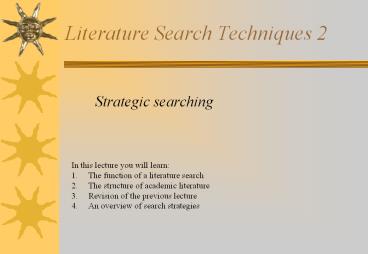Literature Search Techniques 2 Strategic searching In this - PowerPoint PPT Presentation
1 / 23
Title:
Literature Search Techniques 2 Strategic searching In this
Description:
Literature Search Techniques 2 Strategic searching In this lecture you will learn: The function of a literature search The structure of academic literature – PowerPoint PPT presentation
Number of Views:50
Avg rating:3.0/5.0
Title: Literature Search Techniques 2 Strategic searching In this
1
Literature Search Techniques 2
- Strategic searching
- In this lecture you will learn
- The function of a literature search
- The structure of academic literature
- Revision of the previous lecture
- An overview of search strategies
2
1. The function of a literature search
3
What is the Purpose of a Literature
Search/Review? (1 Cognitive)
- To avoid reinventing the wheel
- To find out what other scholars are writing about
your topic - To learn methods and approaches that are
appropriate for your study - To learn appropriate theory to underpin your work
4
What is the purpose of a Literature
Search/Review? (2 social)
- To demonstrate to your audience that your
contribution is new different from everyone
elses - Nobody will believe you unless you can
demonstrate through the literature review that
you know what everyone else has done - In an MSc to demonstrate to your teachers that
you can do an effective literature review - Because literature reviews are an accepted part
of university projects/research and your project
will not look like a good project without one
5
What Information Should You Look For?
- Publications that cover the same or a similar
topic to yours - Publications that support your methods
- E.g. Stats, Systems Analysis, Database
Normalisation, Project Management, OO programming - Background information books
- E.g. The Web, The JAVA programming language,
electronic security
6
2. The structure of academic literature
7
Overall Structure
Research Topic
Specialist sub-area
Relevant Primary research
Your research question
8
Advanced literature search
Topic 1
5
10
5
Specialist area
50
5
10
Topic 3
10
5
Topic 2
9
Afieldstructure
10
3. Revision of the previous lecture
11
Sources for Literature Reviews
- The Library
- Look through the list of journals and browse the
books on the shelves to find relevant ones - Digital Libraries
- Need to use keyword searches to identify relevant
articles - The Web
- Use keyword searches in Google (which indexes PDF
and PostScript academic publications)
12
The Strengths and Weaknesses of the Different
Sources
- Books vs. journal articles vs conference
proceedings vs. the web - Which tend to be the best for
- Currency
- Authority
- Understandability?
- Which types of task would each source be best
for? - Academic papers are quality controlled many are
rejected as being incorrect or uninteresting
13
Literature search techniques
- Keyword search
- To find topically relevant information from
digital libraries, databases, or the web - Good in most cases
- Browsing
- To sift through collections of potentially
relevant text - Good where there are many relevant
books/articles, but only a few can be selected - Chaining
- Tracking references and citations to find
articles relevant to a topic - Good where the topic is very small
14
Example search engines
- Look for web page on search engines read page
- Look for book on search engines read
introduction, contents list, look for subtopic - Start keyword searching for subtopic in digital
libraries - Chain key authors and papers for subtopic
- Read the likely papers and pick one as your main
paper
15
Exercise
- Class vote on answers
16
(No Transcript)
17
4. Overview of search strategies
18
Literature search strategy
19
Literature search -real?
20
Alternative literature search strategy
- A practical strategy?
- Do general searches until you find a paper that
you think you could understand use it as the
basis for your research - Author/reference/citation chain from this paper
- Keyword searches to get papers relevant to
subtopic
21
Alternative literature search strategy
22
Your progress
- The following should occur as you progress
- Increase in knowledge of the subject
- Increase in general knowledge of the specialist
topic - Increase in your specialist vocabulary
- Increase in confidence that you can complete the
task
23
Homework Task
- Conduct a literature search for your chosen
sub-area for the second assessment - Report
- The searches conducted (digital libraries, OPAC
etc) - The titles found from each search
- Discuss which types of publication (books,
journal articles, Web, conference papers) should
be used to give the different types of
information needed - Make a list of problems/issues that arose with
your search - You do not need to print out all the articles you
found































